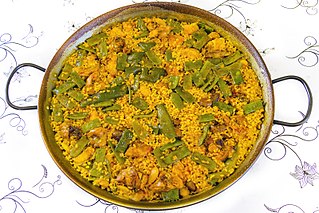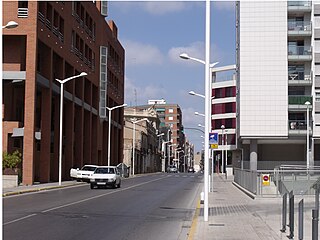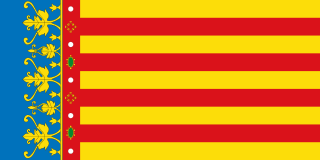
Catalan is a Western Romance language. It is the official language of Andorra, and an official language of three autonomous communities in eastern Spain: Catalonia, the Balearic Islands and the Valencian Community, where it is called Valencian. It has semi-official status in the Italian comune of Alghero, and it is spoken in the Pyrénées-Orientales department of France and in two further areas in eastern Spain: the eastern strip of Aragon and the Carche area in the Region of Murcia. The Catalan-speaking territories are often called the Països Catalans or "Catalan Countries".

Paella is a rice dish originally from the Valencian Community. Paella is regarded as one of the community's identifying symbols. It is one of the best-known dishes in Spanish cuisine.

Valencia, officially València, is the capital of the province and autonomous community of the same name in Spain. It is the third-most populated municipality in the country, with 807,693 inhabitants within the municipality, 1,582,387 inhabitants within the urban area and 2,522,383 inhabitants within the metropolitan region. It is located on the banks of the Turia, on the east coast of the Iberian Peninsula on the Mediterranean Sea.

Valencian or the Valencian language is the official, historical and traditional name used in the Valencian Community of Spain to refer to the Romance language also known as Catalan, either as a whole or in its Valencia-specific linguistic forms. The Valencian Community's 1982 Statute of Autonomy officially recognises Valencian as the name of the regional language.

Alboraya or Alboraia is a town and municipality of the province of Valencia, Spain. It is situated very close to the city of Valencia.

The Valencian Nationalist Bloc was a Valencian nationalist party in the Valencian Country, Spain. It was the largest party in the Coalició Compromís until 2021, when it was replaced in a refoundation process by Més–Compromís.

Mislata is a city in the Valencian Community, Spain. It has borders with the city of Valencia and Quart de Poblet in the west and Xirivella in the south.

Horta Nord is a comarca in the province of Valencia, Valencian Community, Spain.
The Valencian Pilota Squad are the Valencian pilota professional or amateur players chosen to take part in the Handball International Championships representing Spain, even though all of them are Valencians and they use the Valencian flag,.

Catarroja is a municipality in the comarca of Horta Sud in the Valencian Community, Spain.
Moncada is a municipality in the comarca of Horta Nord in the Valencian Community, Spain.

Simat de la Valldigna is a municipality in the comarca of Safor in the Valencian Community, Spain. It is 50 km from Valencia, and 20 km from Cullera and Gandia. It is also near Xàtiva and Alzira.

The Socialist Party of the Valencian Country is a social-democratic political party in the Valencian Community, and is a regional branch of the national Spanish Socialist Workers' Party (PSOE).
The 2007 edition of the Handball International Championships was the VII European Championship, organized by the International Ball game Confederation, and was held at the Belgian cities of Nivelles and Buizingen during September 21 and 23.
Valencian nationalism or Valencianism is a political movement in the Valencian Community, Spain.

The Valencian Community is an autonomous community of Spain. It is the fourth most populous Spanish autonomous community after Andalusia, Catalonia and the Community of Madrid with more than five million inhabitants. Its homonymous capital Valencia is the third largest city and metropolitan area in Spain. It is located along the Mediterranean coast on the east side of the Iberian Peninsula. It borders Catalonia to the north, Aragon and Castilla–La Mancha to the west, and Murcia to the south, and the Balearic Islands are to its east. The Valencian Community is divided into three provinces: Castellón, Valencia and Alicante.

Valencians are the native people of the Valencian Community, in eastern Spain. Since 2006, the Valencian people are officially recognised in the Valencian Statute of Autonomy as a nationality "within the unity of the Spanish nation". The official languages of Valencia are Valencian and Spanish.

Coalició Compromís, also known as Compromís, is a Valencianist electoral coalition in the Valencian Community, Spain. The parties involved include Més-Compromís, the left-wing Valencian People's Initiative, and the ecologist group Greens Equo of the Valencian Country and independent members. Together, they defend Valencianist, progressive and ecological politics.

Víctor Camarasa Ferrando is a Spanish professional footballer who plays as a central midfielder for CD Eldense.


















